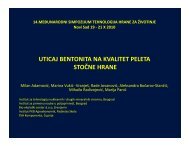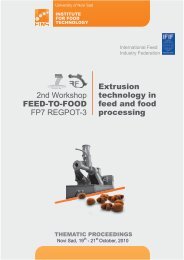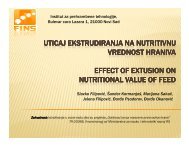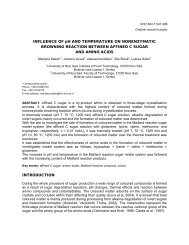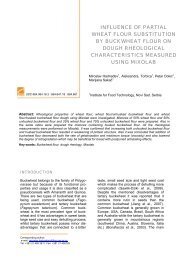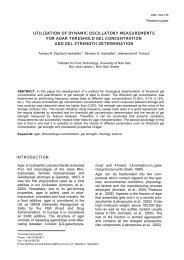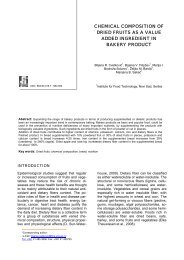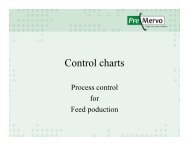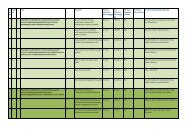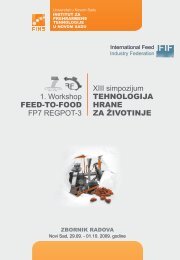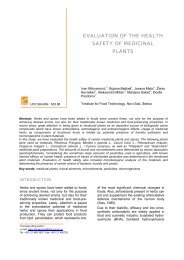Effects of dietary n-3 polyunsaturated fatty acids and ... - FINS
Effects of dietary n-3 polyunsaturated fatty acids and ... - FINS
Effects of dietary n-3 polyunsaturated fatty acids and ... - FINS
You also want an ePaper? Increase the reach of your titles
YUMPU automatically turns print PDFs into web optimized ePapers that Google loves.
1 st WorkshopXIII International Feed Technology Symposiumcontradictory effect on blood serum protein (poultry); no sure effect on egg yolk lipids<strong>and</strong> <strong>fatty</strong> aids composition (laying hens).The comparison <strong>of</strong> experimental results from feeding the additive BIOPRO as probioticin sires` diets showed that: the great relative effect was obtained on the blood level <strong>of</strong>Mg; both the levels <strong>of</strong> blood total protein <strong>and</strong> P were increased; no effect was obtainedon the level <strong>of</strong> Ca <strong>and</strong> the blood glucose had tendency to lower; there was positivecorrelation between levels <strong>of</strong> Zn both in the blood <strong>and</strong> sperm.The shortage <strong>and</strong> continuous price enhancement <strong>of</strong> traditional nutritive substances in theanimals diets calls for search <strong>of</strong> their alternative. In Bulgaria the research in this area isinsufficiently. There are not investigations for rabbits. In this respect is interesting tostudy the dry distillers grain <strong>of</strong> wheat (DDGW), produced by Geo Milev Ltd, IskarStation, S<strong>of</strong>ia, as a source <strong>of</strong> crude protein (CP) - 26% <strong>and</strong> crude fiber (CF) -13% as wellas the meadow hay <strong>and</strong> wheat straw as main sources <strong>of</strong> crude fibers in the growingrabbits diets. Our experimental work goes on with other kind <strong>of</strong> dry distillers` grain.Iodine, a requisite substrate for the synthesis <strong>of</strong> thyroid hormone, is known to causepathological conditions when its intake is excessive or deficient. We examinedbiological effect <strong>of</strong> Iodine in biological active form from Jodis concentrate produced byUkraine. Our experimental results by poultry <strong>and</strong> rabbits showed sure effects on level <strong>of</strong>production, mortality, reproductive capacity <strong>and</strong> biochemical changes <strong>of</strong> the bloodparameters.Our conclusions here are in agreement with biological sensible concept <strong>of</strong> animal health<strong>and</strong> quality <strong>of</strong> animal products influenced by nutrition.Key words: animal, nutrition, additives, BIO-PRO, OVOCAP, DDGW, plant extract,Tribulus terrestris, Jodis concentrateINTRODUCTIONAlthough the world`s population is expected to grow by only 25% in the next 20 years,an increase <strong>of</strong> 50% in the dem<strong>and</strong> for food <strong>of</strong> animal origin is projected. The decrease inabsolute <strong>and</strong> per capita l<strong>and</strong> area available for agricultural use will result in less areaavailable for producing feed <strong>and</strong> to increased competition between humans <strong>and</strong> animalsfor energy <strong>and</strong> nutrients. In this context it is an important task <strong>of</strong> the science <strong>of</strong> animalnutrition to discover <strong>and</strong> exploit new resources, particularly product which cannot beused directly by humans (e.g. high-fiber organic substances) or which are consideredundesirable or unsuitable for human consumption (<strong>of</strong>fal <strong>and</strong> other food industry byproducts).Whereas the utilization <strong>of</strong> conventional feedstuffs <strong>and</strong> nontraditionalbyproducts in animal nutrition was once an extremely economic model for recycling, inthe recent years doubts have arisen, due to the occurrence <strong>of</strong> BSE <strong>and</strong> the discovery <strong>of</strong>dioxins in the feed. In EU agricultural policy has in part responded to these issues withnew regulations. But it is very doubtful it can be considered ecologically responsible,economically reasonable or in the long time politically justifiable to use byproductsconsidered valuable by nutritionists as fuel or to dispose <strong>of</strong> them as waste. Such a trendmay be tenable for short tine in Europe, but it will not be acceptable worldwide,particularly in regions where feed supplies are scare.75



